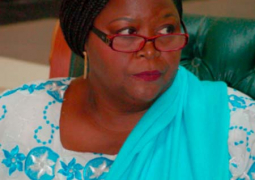The National Disaster Management Agency (NDMA) recently concluded a two-day Disaster Risk Reduction (DRR) Advocacy workshop for journalists and security personnel.
Lamin Nyabally, permanent secretary at the Office of the Vice President, told participants at the Baobab Holiday Resort in Bijilo that they could play an important role in disaster risk reduction.
He said that the NDMA was established by an Act of Parliament in 2008 as the central body entrusted with the coordination of all kinds of disasters in The Gambia.
He revealed that the operations of the agency are now totally decentralised with all seven administration regions having their respective offices.
According to him, in the past years and 2010 in particular, all regions in the country were affected by various kinds of disasters and floods in particular causing uncountable agony to human life, field crops, livestock and the environment.
"The Government is fully aware of the fact that giving handouts to victims in the long term cannot be sustainable," he said. "This approach of NDMA will bring a multi-stakeholder participatory approach at all levels and will integrate DRR in sustainable development policies and planning in order to promote a transparent, systematic and consistent approach to DRR assessment and management system."
Mr Nyabally said further: "As disaster cuts across all areas of activity of Government, NGOs, private sectors and civil society organisations, the NDMA is to engage all stakeholders in its advocacy drive on DRR as a means to reaching them and ultimately to the communities to ensure that they are fully equipped and involved in DRR enabling them to anticipate and respond to disasters."
PS Nyabally called on participants to continue to play their part in the creation of awareness at all levels.
"It is important as journalists to look at the causes, consequences, the possible impact, handouts, to mention few, to have access to those documents so that you know the gravity of the problem related to what we are doing in The Gambia, how it may also affect our region, our sub-region," he said.
The Armed Forces Chief of Defence Staff (CDS), Lieutenant General Masanneh Kinteh, said that the workshop brought to his attention the issue of disaster reduction in a world that is increasingly becoming more vulnerable to all disasters.
In The Gambia, CDS Kinteh said, DRR should be a major undertaking due to lack of capacity, adding that he is quite optimistic that the workshop would improve and strengthen awareness of DRR mechanisms through the involvement and participation of implementing partners.
He added that the workshop would also create a strong partnership and networking on disaster risk management between all stakeholders. "The inclusion of the media and security forces in this workshop was a step in the right direction," he noted.
According to CDS Kinteh, it is generally agreed that national governments should be the main actors in DRR.
"They have a duty to ensure the safety of citizens, the resources and capacity to implement large-scale DRR, a mandate to direct or coordinate the work of others, and they create the necessary policy and legislative frameworks," he said.
He also described DRR as a systematic approach to identifying, assessing and reducing the risks of disaster, adding that it is a relatively new concept in formal terms, but it embraces much earlier thinking and practice, and it is now being widely embraced by international agencies, governments, disaster planners and civil organisations.
The executive director of the NDMA, Essa Khan, dilated on the importance of the DRR Advocacy workshop, saying the DRR Advocacy workshop would be one of the series of workshops his Agency intends to organise for all sections of the society.
The opening ceremony was also graced by Herman TC Chiu, Deputy Ambassador of The Republic of China Taiwan, and the WFP Country Director.



